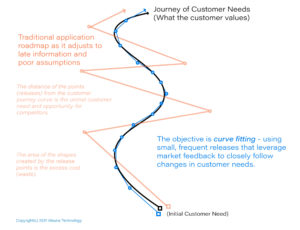Mobile applications have become a required part of every industry. While a differentiator for many companies, it remains difficult to realize maximum value from the investment. Here are some recommendations we have to help you succeed in the marketplace with your mobile application.
Business First
Keep focus on the business. To be successful it is important to determine if a mobile application is a good fit for the company. Important questions to ask are:
- Is there sufficient business need and focus within the organization?
- Are resources available to make the mobile application a success?
- Does the mobile application further the mission or goals of the company?
Purpose
Define the purpose of the mobile application. While the answer may seem obvious, it is very important to state this clearly for all stakeholders to understand. Some examples include:
- Match competitor offerings
- Introduce a new business model
- Provide better customer experience
Success Criteria
Clearly define success criteria. There should be a business objective behind the mobile application and ways to measure success. Having a clear definition of success allows all stakeholders to agree on whether the mobile application met its objectives, and align on what needs done.
Market Research
Business leaders are very close to the products and services that they offer. It is surprisingly difficult to judge the customers’ perception of value. For this reason, we recommend that you interview current and prospective customers. Doing this legwork upfront will help determine the initial release features, the business model, and help communicate the value to other prospective customers.
These discoveries save considerable time and money by providing a better starting point for market entry – both with mobile features and with marketing content.
Minimum Viable Product (MVP)
Minimum Viable Product (MVP) is the smallest set of features that can be released and still accomplish the immediate business goal. This is possibly our most important recommendation of all. Intense focus on MVP (the more intense the better) reduces up-front cost of technical and marketing work. It also reduces cost overtime resulting from developing and marketing features that the market does not value highly enough.
Focus on MVP mitigates mistakes that may be made in other areas by releasing early, and in small updates – allowing market feedback to identify incorrect assumptions (a common occurrence). While MVP is typically viewed in terms of product launch, it is a healthy approach to every release, and every business activity throughout the mobile application lifecycle.
Release Early and Learn
Like MVP, the value of releasing early cannot be overstated. By releasing a mobile application to market at the earliest possible opportunity, a company begins two critical activities: learning, and revenue capture. The activity of learning helps keep features in line with what customers value. Revenue capture begins monetization and measurement of the business model – as well as opportunities to grow a loyal customer base.
Finally, have mechanisms in place to capture and evaluate market feedback. A clear, reliable feedback system allows leadership to adjust and deliver value in line with customer needs.
Success with mobile applications is not entirely about software. It is about leveraging the mobile application to realize your business objectives. By applying these recommendations, our customers track closer to changing customer needs. They are able to deliver value more quickly – a considerable competitive advantage. To learn more about how to apply these recommendations to your own mobile application, visit us at mauka.us/mobile or schedule a brief call with one of our leaders.
Visit us at: Maukatechnology.com
Schedule a call: Calendar
Follow us: LinkedIn

